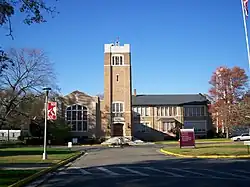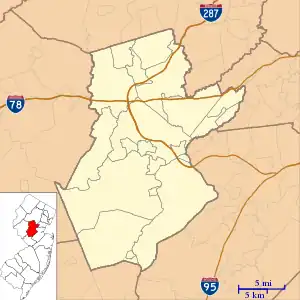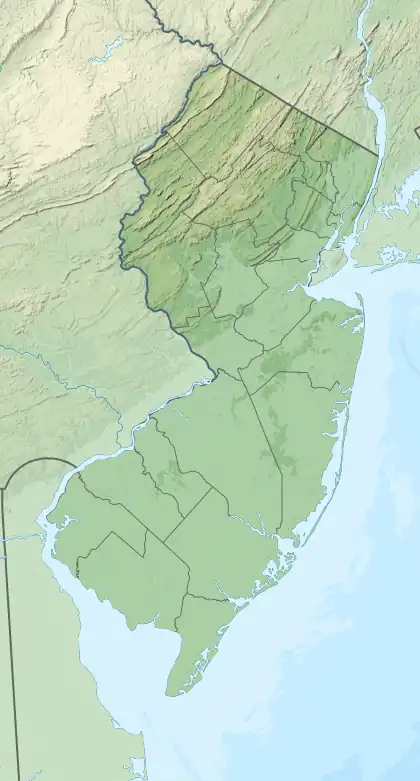Zarephath, New Jersey | |
|---|---|
 Pillar of Fire chapel in Zarephath, New Jersey | |
 Zarephath Location in Somerset County  Zarephath Location in New Jersey  Zarephath Location in the United States | |
| Coordinates: 40°32′04″N 74°34′20″W / 40.534573°N 74.572191°W[1][2] | |
| Country | |
| State | |
| County | Somerset |
| Township | Franklin |
| Area | |
| • Total | 0.44 sq mi (1.13 km2) |
| • Land | 0.40 sq mi (1.04 km2) |
| • Water | 0.03 sq mi (0.09 km2) 9.12% |
| Elevation | 75 ft (23 m) |
| Population | |
| • Total | 69 |
| • Density | 172.5/sq mi (66.6/km2) |
| Time zone | UTC−05:00 (Eastern (EST)) |
| • Summer (DST) | UTC−04:00 (Eastern (EDT)) |
| ZIP Code | 08890[6] |
| Area code | 908 |
| FIPS code | 34-83290[1][7][8][9] |
| GNIS feature ID | 02584041[1][10] |
Zarephath (/ˈzærəˌfæθ/, ZARRA-fath) is an unincorporated community and census-designated place (CDP) and located in Franklin Township, in Somerset County, in the U.S. state of New Jersey, about 15 mi (24 km) north of Princeton.[11][12][13] As of the 2020 United States census, the CDP's population was 69,[5] an increase of 32 (+86.5%) from the 37 enumerated at the 2010 census.[14]
It was the communal home of the Pillar of Fire Church, and was the worldwide headquarters of Pillar of Fire International, which comprises the church's college, Somerset Christian College, and radio station WAWZ-FM (the farm and publishing facilities have not been in operation since the late 1970s). It is named after Zarephath, the place in the Bible where the "widow woman" sustained the prophet Elijah. Zarephath was a group of buildings located between the Delaware and Raritan Canal and the Millstone River. Following the flooding in 2011 from Hurricane Irene, the College and all Pillar of Fire ministries were ordered to move out of this floodplain. The original campus has been slated for demolition and a new campus in Somerset was established.[15][16]
Geography
According to the United States Census Bureau, Zarephath had a total area of 0.445 square miles (1.152 km2), including 0.404 square miles (1.047 km2) of it is land and 0.041 square miles (0.105 km2) of water (9.12%) is water.[1][2]
Demographics
| Census | Pop. | Note | %± |
|---|---|---|---|
| 2010 | 37 | — | |
| 2020 | 69 | 86.5% | |
| Population sources: 2010[14] 2020[5] | |||
2010 census
The 2010 United States census counted 37 people, 19 households, and 7 families in the CDP. The population density was 91.5 per square mile (35.3/km2). There were 20 housing units at an average density of 49.5 per square mile (19.1/km2). The racial makeup was 97.30% (36) White, 2.70% (1) Black or African American, 0.00% (0) Native American, 0.00% (0) Asian, 0.00% (0) Pacific Islander, 0.00% (0) from other races, and 0.00% (0) from two or more races. Hispanic or Latino of any race were 5.41% (2) of the population.[14]
Of the 19 households, 15.8% had children under the age of 18; 36.8% were married couples living together; 0.0% had a female householder with no husband present and 63.2% were non-families. Of all households, 57.9% were made up of individuals and 47.4% had someone living alone who was 65 years of age or older. The average household size was 1.95 and the average family size was 3.43.[14]
18.9% of the population were under the age of 18, 5.4% from 18 to 24, 13.5% from 25 to 44, 10.8% from 45 to 64, and 51.4% who were 65 years of age or older. The median age was 66.5 years. For every 100 females, the population had 54.2 males. For every 100 females ages 18 and older there were 66.7 males.[14]
Origins
.jpg.webp)
The site was originally a farm owned by Peter Workman Garretson in Franklin Township. He married Caroline Van Neste Field, who became a follower of Alma Bridwell White, then based in Denver, Colorado. Field donated the land to the church after meeting her. The church assumed all debts associated with the mortgage on the property, which were considerable; it was agreed the church would take title to the land upon repayment of the mortgage. Zarephath was named from a phrase in 1 Kings 17, because White saw a parallel with relocation to a farm and the story of Elijah and a widow.[17]
Pillar of Fire International takes its name from a phrase used in Exodus 13:21: "He guided the Israelites on their escape from Egypt by giving them a pillar of fire to light their way across the dark wilderness". It was founded by Alma White in 1901 and originally called the Pentecostal Union. They moved to Franklin Township in 1907 or 1908. The organization is also located in Denver, Colorado. The name was changed from The Pentecostal Union to Pillar of Fire in October 1917 as the group identified as Methodist rather than Pentecostal.[17] It is now known as Pillar of Fire International. The buildings on the grounds were built by members of the Zarephath community, as they stressed self-reliance. They farmed a portion of the 1,000-acre (400 ha) property.
Education
The Zarephath Bible Institute was founded in 1908 as a "training school for missionaries, preachers, and teachers."[18] It was later renamed the Zarephath Bible Seminary.[19]
On September 11, 1912, the Zarephath Academy opened with an enrollment of fifty students, five who were ready for high school. "At this time, the doors were formally opened to all who wanted an education under Christian control, high school as well as elementary." It was later renamed Alma Preparatory School. The first high school graduation exercises, for a class of four, were held at the Pillar of Fire Temple on June 12, 1916. The school was accredited by the New Jersey State Board of Education on November 14, 1916.[19]
Informal college level classes were held starting in 1917.[19]
Alma White College was chartered in 1921 and operated until 1978.[20][21] In 1923 the Ku Klux Klan provided funding for the school, making it "the second institution in the north avowedly run by the Ku Klux Klan to further its aims and principles."[22][23] The first two Doctor of Divinity degrees, one honorary, were conferred in 1927.[24] Arthur Kent White received an honorary one; and Alton Milford Young received the second. Young at one time was the Grand Kaliff of the Ku Klux Klan in New Jersey.[25][26]
Somerset Christian College was established on March 23, 2001. Somerset Christian College is licensed by the New Jersey Commission on Higher Education to grant a two-year associate degree in Biblical studies. Starting in fall 2006, the school started offering a four-year degree.[27]
Floods of 1971, 1999 and 2011
Tropical Storm Doria in 1971 and Hurricane Floyd in September 1999 brought record floods to the areas adjacent to the Millstone River, which is located along one edge of the Zarephath campus. Despite maintaining a twelve-foot-high flood levee, Zarephath was inundated with water from the nearby river and Delaware and Raritan canal. In 1999 the flood crest was a record one, over three feet higher than the previously recorded crest in the river basin. The water level in the Zarephath compound was seven feet at the height of the flood.[28] The church's damage from Floyd was estimated at $2.5 million.[29]
Hurricane Irene destroyed much of the campus again in late August 2011[30] According to the Somerset Christian College website, authorities have ordered the Zarephath Campus to be abandoned because of its location in the floodplain. The school has since renamed itself Pillar College and located elsewhere in Somerset.[31] It also conducts some classes in Newark.
Davis Burial Ground

The Davis Burial Ground is on Weston Canal Road near the Delaware and Raritan Canal. It contains about 100 graves with maybe 50 extant tombstones, including those of Simeon Van Nortwick II (1724-1813), son of Simeon Van Nortwick I (1687-c.1774) of Utrecht, Netherlands and Folkease Volkertje (c.1690-?). On the opposite side of the canal is a similar cemetery, Van Nest – Weston Burying Ground in Manville.
Gallery
.jpg.webp) Music ensemble broadcast at Alma White College, Pillar of Fire Church, on WAWZ Radio, Zarephath, New Jersey circa 1920
Music ensemble broadcast at Alma White College, Pillar of Fire Church, on WAWZ Radio, Zarephath, New Jersey circa 1920 Historical photo of Zarephath campus from Klansmen: Guardians of Liberty, 1926
Historical photo of Zarephath campus from Klansmen: Guardians of Liberty, 1926.jpg.webp) The Old Canal Bridge, Zarephath Academy Zarephath, New Jersey
The Old Canal Bridge, Zarephath Academy Zarephath, New Jersey The Main Building in Zarephath, New Jersey, built in the early 1900s, in 2015.
The Main Building in Zarephath, New Jersey, built in the early 1900s, in 2015.
See also
Footnotes
- 1 2 3 4 Gazetteer of New Jersey Places, United States Census Bureau. Accessed July 21, 2016.
- 1 2 US Gazetteer files: 2010, 2000, and 1990, United States Census Bureau. Accessed September 4, 2014.
- ↑ "ArcGIS REST Services Directory". United States Census Bureau. Retrieved October 11, 2022.
- ↑ U.S. Geological Survey Geographic Names Information System: Zarephath Census Designated Place, Geographic Names Information System. Accessed June 27, 2012.
- 1 2 3 "Census Population API". United States Census Bureau. Retrieved October 11, 2022.
- ↑ Look Up a ZIP Code for Zarephath, NJ, United States Postal Service. Accessed June 27, 2012.
- ↑ U.S. Census website, United States Census Bureau. Accessed September 4, 2014.
- ↑ Geographic codes for New Jersey, Missouri Census Data Center. Accessed June 9, 2023.
- ↑ Geographic Codes Lookup for New Jersey, Missouri Census Data Center. Accessed June 9, 2023.
- ↑ US Board on Geographic Names, United States Geological Survey. Accessed September 4, 2014.
- ↑ GCT-PH1 - Population, Housing Units, Area, and Density: 2010 - County -- County Subdivision and Place from the 2010 Census Summary File 1 for Somerset County, New Jersey Archived 2020-02-12 at archive.today, United States Census Bureau. Accessed February 11, 2013.
- ↑ 2006-2010 American Community Survey Geography for New Jersey, United States Census Bureau. Accessed February 11, 2013.
- ↑ New Jersey: 2010 - Population and Housing Unit Counts - 2010 Census of Population and Housing (CPH-2-32), United States Census Bureau, August 2012. Accessed February 11, 2013.
- 1 2 3 4 5 DP-1 - Profile of General Population and Housing Characteristics: 2010 Demographic Profile Data for Zarephath CDP, New Jersey Archived 2020-02-12 at archive.today, United States Census Bureau. Accessed June 278, 2012.
- ↑ Campus Updates, Somerset Christian College, November 8, 2011, backed up by the Internet Archive as of February 6, 2012. Accessed February 8, 2020.
- ↑ Heyboer, Kelly. "Somerset Christian College reborn as Pillar College after flood", NJ Advance Media for NJ.com, July 28, 2013, updated March 30, 2019. Accessed February 8, 2020. "Nearly two years ago, hope for Somerset Christian College's future was literally floating away. Floodwaters from Tropical Storm Irene had swamped the private college’s campus in the Zarephath section of Franklin Township.... Two years later, the school has a new name — Pillar College — along with a new campus in Somerset, a thriving site in Newark and ambitious plans to expand into other parts of New Jersey. School officials say the storm may have been one of the best things to ever happen to one of the state’s smallest colleges."
- 1 2 William B. Brahms (1998). Franklin Township, Somerset County, NJ: A History. Franklin Township Public Library. ISBN 0-9668586-0-3.
- ↑ "Mission, Vision and History". Somerset Christian College. Archived from the original on January 30, 2010. Retrieved December 13, 2009.
Zarephath Bible Institute (ZBI) was founded in 1908 as a training school for missionaries, preachers, and teachers. Over the years, it has prepared many students to serve in various occupations in numerous Christian ministry organizations.
- 1 2 3 Gertrude Metlen Wolfram (1954). The widow of Zarephath. Pillar of Fire Church.
In June 1917 our people made the acquaintance of an elderly German professor, who came to Zarephath offering to conduct classes on the college level for such persons as might care to attend them. Several other classes were organized under some of our own professors, and all were conducted according to regular college schedules, meeting requirements as to hours, numbers of classes, and character of work done. In May 1921 application was made to the State Board of Education at Trenton, New Jersey, for a college charter, which, after due inspection and consideration, was granted, and Alma College became a reality. In order to distinguish and avoid confusion in connection with another Alma College, the name was subsequently changed to Alma White College.
- ↑ Robert McHenry (1983). Famous American women. Dover. p. 438. ISBN 0-486-24523-3.
... in 1921, Alma White College in Zarephath ...
- ↑ "Closed & Renamed New Jersey Colleges & Universities". New Jersey. Retrieved December 11, 2009.
Closed: Alma White College, 1978
- ↑ "Klan Will Sweep Colleges, She Says. Princeton Will Soon Be Vitally Interested in the Order, Woman Bishop Asserts. Back From Ku Klux Tour. University Paper Declares Institution Should Not Be Influenced by Specious Arguments". The New York Times. November 1, 1923. Retrieved December 16, 2009.
That the Ku Klux Klan is on the verge of 'sweeping through the colleges of the country as it has swept through the masses,' was the assertion of Bishop Alma White, founder of the 'Pillar of Fire,' a religious sect and the head of a small institution called the Alma College, fifteen miles north of Princeton at Zarephath, in an interview published this morning in the Daily Princetonian.
- ↑ "Klan Buys College Close to Princeton". The Harvard Crimson. October 31, 1923. Retrieved July 6, 2009.
Bishop Alma White, the founder of the Pillar of Fire Church, and an author of various religious works, is President of the institution under the new regime. In an interview for the Princetonian today Bishop White deplored the present indifference of the undergraduate to the Klan and predicted that in the near future "it will sweep through the intellectual student classes as through the masses of the people."
- ↑ "Zarepath Colony Institution in New Jersey Confers High Honors for First Time". The New York Times. June 19, 1927. Retrieved July 6, 2009.
For the first time in its history Alma College, at Zarepath, near Bound Brook, N.J., conferred the degree of Doctor of Divinity during its commencement exercises, which took place last week.
- ↑ Investigation of Un-American Propaganda Activities in the United States. United States Government Printing Office. 1944.
I am former grand kaliff of the State, which is vice Grand Dragon. ... I was made grand kaliff the day Mr. Bell was made grand dragon and I don't quite ...
- ↑ David Mark Chalmers (1987). Hooded Americanism: The History of the Ku Klux Klan. Duke University Press. p. 323. ISBN 0-8223-0772-3.
Arthur Bell and Rev. AM Young, the New Jersey Klan secretary were unceremoniously ousted from the Klan despite their long years of dedicated service. ...
- ↑ "Mission, Vision and History". Somerset Christian College. Archived from the original on January 30, 2010. Retrieved December 13, 2009.
ZBI became [sic] Somerset Christian College on March 23, 2001 when the New Jersey Commission on Higher Education issued the license to grant the two-year Associate in Biblical Studies degree. In 2006 the college was approved to offer four-year Bachelor of Arts degrees.
- ↑ "Hurricane Floyd Devastates Pillar of Fire International Headquarters". Pillar of Fire Church. September 17, 1999. Retrieved December 13, 2009.
Pillar of Fire International Headquarters at Zarephath in Somerset, New Jersey, lies on the Raritan River, which was reported to have crested at ten feet above its banks following more than ten inches of rain brought in by Hurricane Floyd. The main campus, including Zarephath Bible Institute, Zarephath Community Chapel, and WAWZ Christian Radio, was under seven feet of water and by Friday morning was under 100% evacuation. Temple Christian Day School, the Pillar of Fire elementary school, is located in nearby Bound Brook, which was inundated by the out-of-banks river.
- ↑ "DEP Aims To Update Its Flood Maps". The Star-Ledger. November 9, 2004. Retrieved December 13, 2009.
When the floodwaters left by Hurricane Floyd in September 1999 receded from the Pillar of Fire religious complex in Zarephath, Somerset County, they revealed more than just the millions of dollars in damage.
- ↑ "Praying for renewal Flood waters ruin entire Zarephath campus". My Central Jersey. August 30, 2011. Retrieved January 10, 2014.
- ↑ Kelly Heyboer (July 28, 2013). "Somerset Christian College reborn as Pillar College after flood". NJ.com. Retrieved April 20, 2015.
Further reading
- Blee, Kathleen M. (1991). Women of the Klan. University of California Press. ISBN 978-0-520-07876-5.
- Alma White's Evangelism Press Reports, compiled by C. R. Paige and C.K. Ingler (1939)
- Kristin E. Kandt; 'In the Name of God; An American Story of Feminism, Racism, and Religious Intolerance: The Story of Alma Bridwell White,' 8 Am. U. J. Gender, Soc. Pol. & L 753 (2000)
- Christianizing the Klan: Alma White, Branford Clarke, and the Art of Religious Intolerance by Lynn S. Neal; June 2009
- Susie Cunningham Stanley (1993). Feminist Pillar of Fire: The Life of Alma White. The Pilgrim Press. ISBN 0-8298-0950-3.
- Wolfram, Gertrude M. (1954). The Widow of Zarephath. Pillar of Fire Church.
External links
- Zarephath Cemetery
- Pillar of Fire
- Franklin Township Public Library Photo Archive of Zarephath compiled by William B. Brahms
- WAWZ (Star 99.1 FM); Zarephath, New Jersey; Owner: Pillar of Fire - Religious oriented music radio station
- Documented Ku Klux Klan Gatherings at Zarephath
